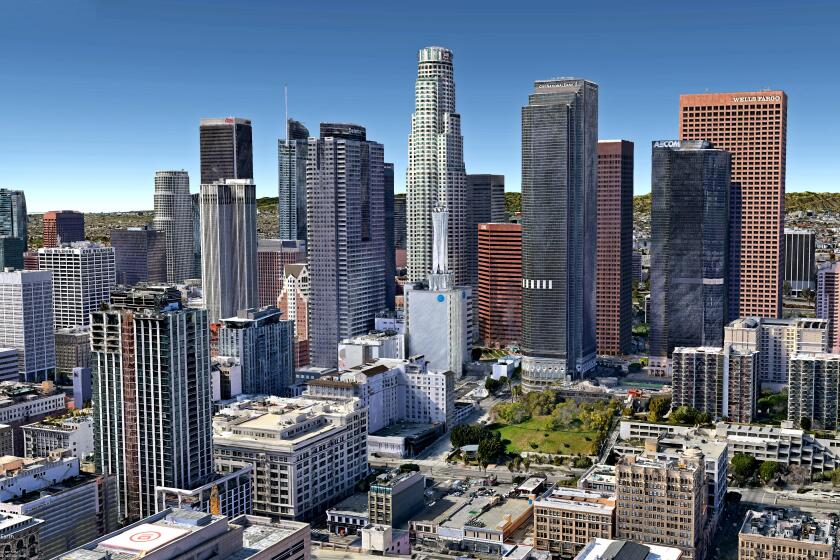Grim data crush 5-day stock rally
The only thing Wall Street had to be thankful for Monday was that stocks didn’t fall further than they did.
Fresh evidence of a softening global economy, and profit taking after last week’s Thanksgiving rally, put a decisive end to the stock market’s biggest five-day winning streak in more than 75 years.
The Dow Jones industrial average slumped almost 700 points after surveys indicated that manufacturing activity plunged last month in the U.S. and other countries.
The data reminded investors that the economy remained in a brutal free fall likely to last well into next year.
“We’re still in this bear market,” said Joe Cusick, senior market analyst at brokerage OptionsXpress in Chicago. “We are now in a confirmed recession, and it’s not going to end in a couple of months.”
Retail stocks tumbled, reflecting doubts that better-than-expected sales on the day after Thanksgiving would continue.
The Dow sank 679.95 points, or 7.7%, to 8,149.09, its worst decline since a 733-point drubbing six weeks ago. The Dow gave back more than half the gains from its explosive five-session rally that began Nov. 21.
The Standard & Poor’s 500 index, which rose 19% during the rally, cratered 80.03 points, or 8.9%, to 816.21. The Nasdaq composite index fell 137.50 points, or 9%, to 1,398.07.
Wall Street pros expected stocks to give back some of last week’s gains, and many clung Monday to hope that the sell-off would be brief and that stocks would be able to remain above their low marks reached Nov. 20.
“We’re having a normal pullback in saw-tooth fashion,” said Tom Wirth, senior investment officer at Chemung Canal Trust Co. in Elmira, N.Y. “I expect the rest of this year we’re going to see higher highs and higher lows.”
Stocks were buffeted Monday by the decline in a private group’s U.S. manufacturing index to its lowest level in 26 years. Similar indexes in Europe and China also fell sharply.
The mood was further damped by a pronouncement from a National Bureau of Economic Research panel, the official arbiter of recessions, that a downturn began at the end of last year.
Despite Black Friday sales that topped some estimates, retailing stocks were hit Monday by worries that many consumers scooped up only bargain-priced items and that shopping levels would recede as the holiday season progressed.
Limited Brands tumbled 19%, while Macy’s sank 14% and J.C. Penney lost 13%. An index of retailing stocks in the S&P; 500 dropped 9.3%.
But as they have throughout the 13-month-old bear market, financial stocks led the way down. The S&P;’s financial index sank 17%.
The economic fears hurting stocks yanked oil prices back below $50 a barrel. Crude futures fell $5.15 to $49.28 a barrel in New York trading.
In the bond market, yields on Treasury obligations fell to historic lows after Federal Reserve Chairman Ben S. Bernanke said the central bank, which has lowered its key short-term interest rate to 1%, might purchase long-term Treasury bonds to stimulate the economy.
The benchmark 10-year Treasury note’s yield fell to 2.71% from 2.92% on Friday. The yield is a full percentage point below its average over the last year.
Given that mortgage rates are normally pegged to the 10-year T-note, the development could lower the cost of buying a home. But such a result is not certain because the turmoil in the housing market has caused loan rates to deviate significantly from Treasury yields.
Mortgage rates last week were about 2.75 percentage points higher than the 10-year Treasury yield, compared with a typical spread of about 1.5 points before the home-loan crisis, said Keith Gumbinger of research firm HSH Associates.
Home lending rates fell sharply last week in the wake of the Fed’s announcement that it would purchase $600 billion in debt issued by Fannie Mae and other mortgage-finance companies.
The average rate for a 30-year fixed-rate mortgage fell to 5.86% from 6.75% on Oct. 15, according to HSH.
--
--
Recession could extend beyond ’09
The downturn began in 2007 as businesses started slashing jobs. PAGE A1
More to Read
Inside the business of entertainment
The Wide Shot brings you news, analysis and insights on everything from streaming wars to production — and what it all means for the future.
You may occasionally receive promotional content from the Los Angeles Times.










